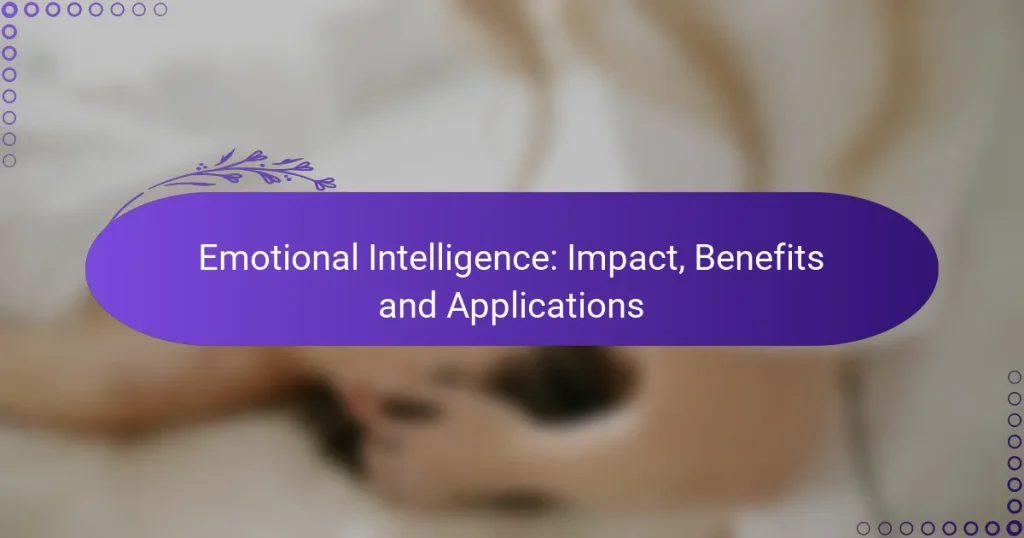Emotional intelligence (EI) plays a crucial role in enhancing workplace dynamics by fostering better communication and interpersonal relationships among employees. By understanding and managing emotions, individuals can collaborate more effectively, leading to improved productivity and decision-making. Additionally, leaders with high EI can create a positive work environment that promotes teamwork and adaptability.
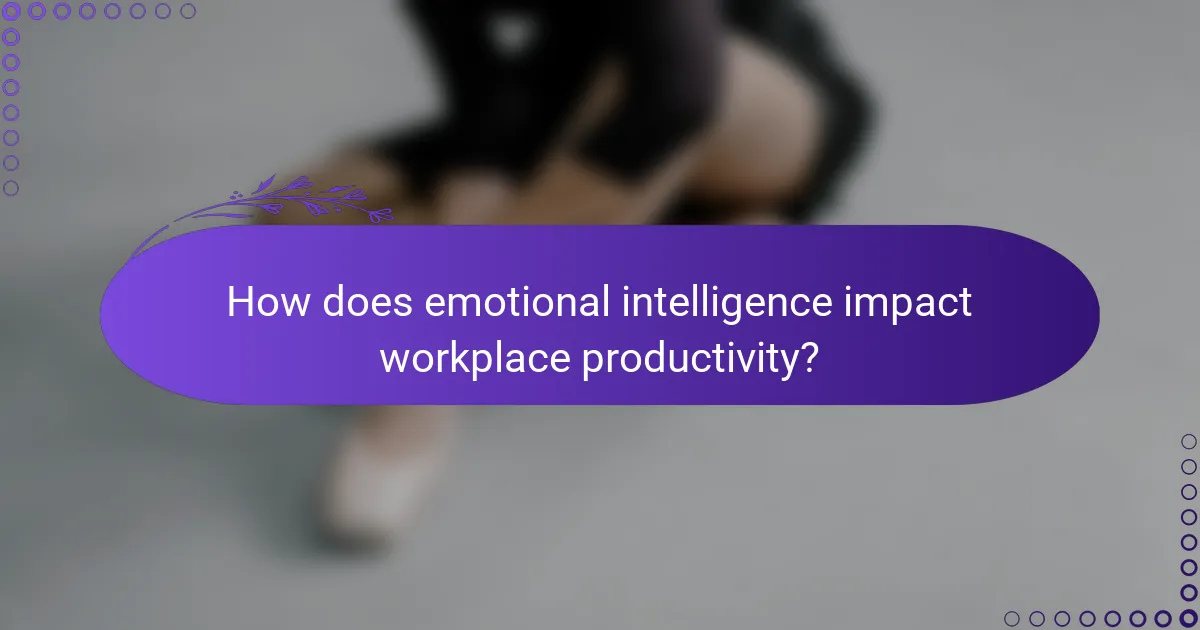
How does emotional intelligence impact workplace productivity?
Emotional intelligence (EI) significantly enhances workplace productivity by improving interpersonal relationships and communication among employees. When team members can understand and manage their emotions, they collaborate more effectively, leading to better outcomes and increased efficiency.
Increased collaboration
Emotional intelligence fosters a collaborative environment by enabling employees to empathize with one another. When team members recognize and respect each other’s feelings, they are more likely to share ideas and work together towards common goals. This synergy can lead to innovative solutions and improved project outcomes.
To enhance collaboration, organizations can implement team-building exercises that focus on emotional awareness and communication skills. Regular feedback sessions can also help maintain open lines of communication and strengthen team dynamics.
Enhanced conflict resolution
High emotional intelligence equips employees with the skills to navigate conflicts constructively. Individuals who can manage their emotions and understand others’ perspectives are better at resolving disputes without escalating tensions. This leads to quicker resolutions and a more harmonious workplace.
Encouraging a culture of open dialogue and active listening can further enhance conflict resolution. Training programs that focus on negotiation and mediation skills can also be beneficial in equipping employees to handle disagreements effectively.
Improved employee morale
Emotional intelligence contributes to higher employee morale by creating a supportive work environment. When employees feel understood and valued, their job satisfaction increases, leading to a more positive workplace atmosphere. This boost in morale can result in increased motivation and productivity.
Organizations can promote high morale by recognizing individual and team achievements, providing opportunities for professional development, and ensuring that employees feel heard through regular check-ins and surveys.
Boosted leadership effectiveness
Leaders with high emotional intelligence are more effective in guiding their teams. They can inspire and motivate employees by understanding their emotional needs and responding appropriately. This ability to connect on an emotional level fosters trust and loyalty within the team.
To develop emotionally intelligent leaders, companies should invest in leadership training programs that emphasize self-awareness, empathy, and communication skills. Regular mentoring and coaching can also help leaders refine their emotional intelligence competencies.
Higher employee retention
Emotional intelligence plays a crucial role in employee retention by creating a workplace where individuals feel valued and understood. When employees experience positive relationships and effective communication, they are less likely to seek opportunities elsewhere. This stability can save organizations significant costs associated with turnover.
To improve retention rates, organizations should focus on building a strong company culture that prioritizes emotional well-being. Implementing mentorship programs and providing resources for mental health support can also contribute to a more engaged and committed workforce.
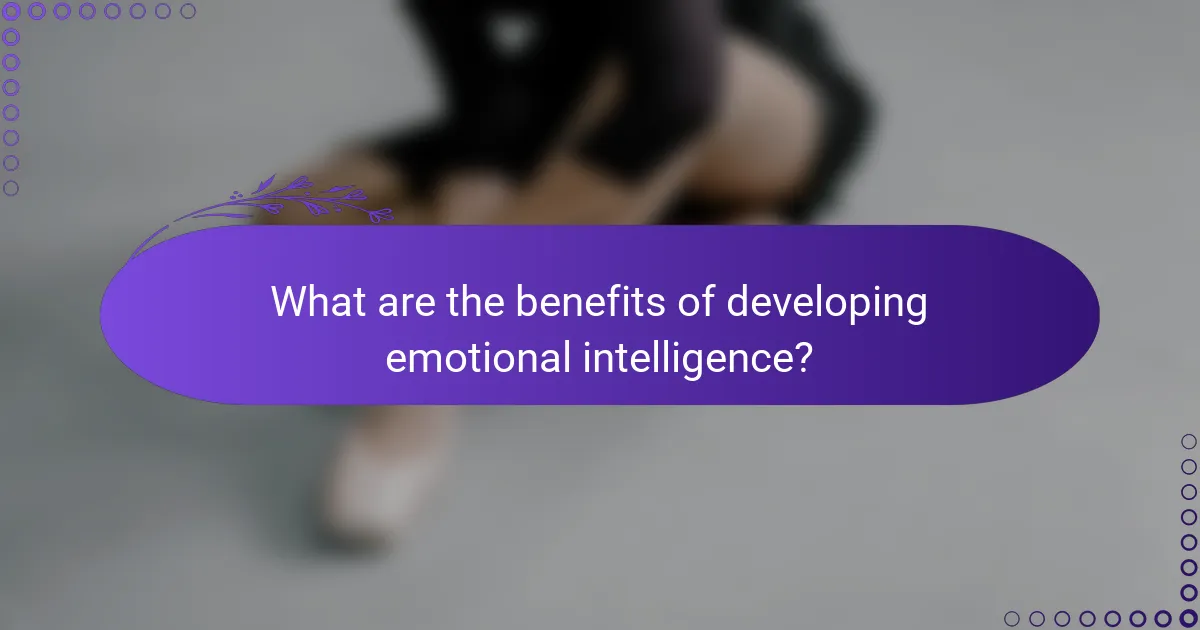
What are the benefits of developing emotional intelligence?
Developing emotional intelligence (EI) offers numerous benefits that enhance personal and professional interactions. It fosters better understanding of emotions, leading to improved relationships, decision-making, adaptability, and stress management.
Stronger interpersonal relationships
Emotional intelligence plays a crucial role in building and maintaining strong interpersonal relationships. By recognizing and understanding both your own emotions and those of others, you can communicate more effectively and empathize with different perspectives.
For instance, active listening and responding thoughtfully can help resolve conflicts and strengthen bonds. Practicing EI can lead to deeper connections with friends, family, and colleagues, ultimately creating a more supportive environment.
Better decision-making skills
Individuals with high emotional intelligence tend to make better decisions, as they can assess emotional factors alongside logical reasoning. This balance allows for a more comprehensive evaluation of situations, leading to choices that align with both personal values and practical outcomes.
For example, when faced with a challenging decision at work, someone with strong EI might consider team dynamics and emotional impacts, resulting in a more inclusive and effective solution. This approach often leads to greater satisfaction among team members and improved overall results.
Increased adaptability
Emotional intelligence enhances adaptability by helping individuals navigate change more effectively. Those with high EI can manage their emotional responses to new situations, allowing them to adjust their behaviors and strategies accordingly.
For instance, during organizational changes, emotionally intelligent employees are more likely to embrace new roles and responsibilities, fostering a positive attitude that can influence their peers. This adaptability not only benefits individual performance but also contributes to a resilient workplace culture.
Enhanced stress management
Developing emotional intelligence equips individuals with tools to manage stress more effectively. By understanding their emotional triggers, people can implement strategies to cope with pressure and maintain a calm demeanor in challenging situations.
Techniques such as mindfulness, deep breathing, and reframing negative thoughts can be particularly useful. For example, recognizing when stress levels are rising allows for proactive measures, preventing burnout and promoting overall well-being.
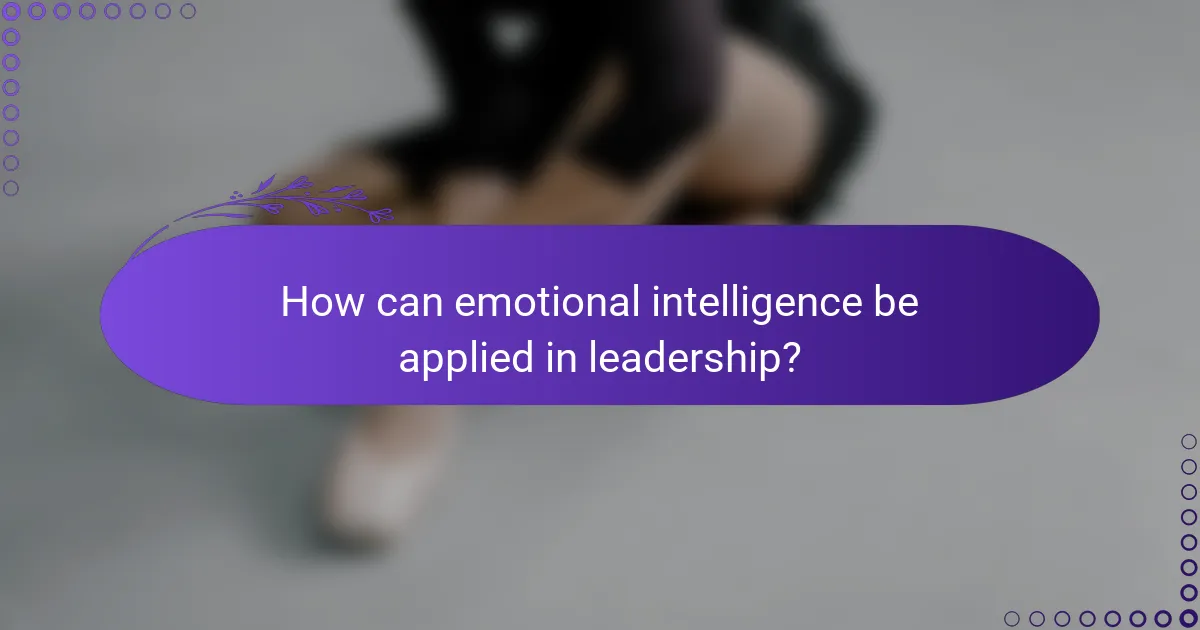
How can emotional intelligence be applied in leadership?
Emotional intelligence in leadership enhances decision-making, fosters collaboration, and improves team dynamics. Leaders who understand and manage their own emotions, as well as those of their team members, can create a more productive and positive work environment.
Empathetic communication
Empathetic communication involves actively listening and responding to the emotions of others. Leaders can practice this by acknowledging team members’ feelings and validating their experiences, which builds trust and rapport.
For example, during a team meeting, a leader might notice a colleague’s frustration and address it directly, asking for their input on how to alleviate the issue. This approach not only resolves immediate concerns but also encourages open dialogue.
Effective team motivation
Leaders can leverage emotional intelligence to motivate their teams by understanding individual drivers and tailoring their approach accordingly. Recognizing what inspires each team member—be it recognition, personal growth, or financial incentives—can significantly enhance motivation levels.
A practical tip is to regularly check in with team members to discuss their goals and aspirations. This can help leaders align tasks with personal motivations, leading to increased engagement and productivity.
Conflict management strategies
Emotional intelligence plays a crucial role in conflict management by enabling leaders to navigate disagreements constructively. Leaders should remain calm and composed, using active listening to understand differing perspectives before seeking a resolution.
One effective strategy is to facilitate a mediation session where all parties can express their viewpoints. This not only helps in reaching a consensus but also fosters a culture of respect and collaboration within the team.
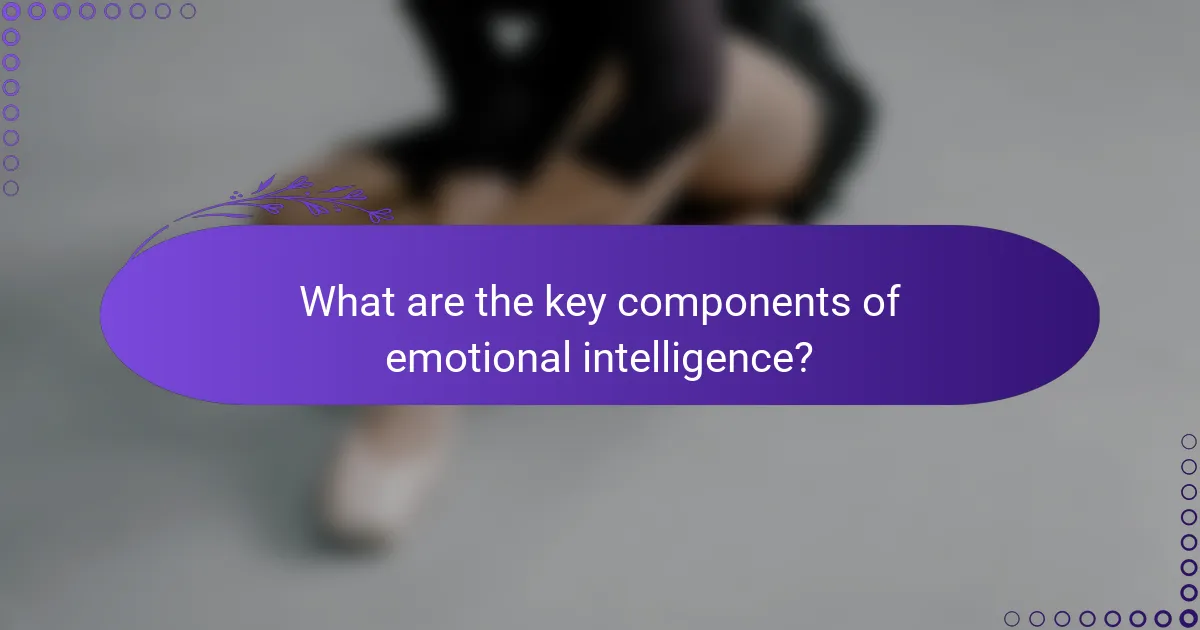
What are the key components of emotional intelligence?
The key components of emotional intelligence include self-awareness, self-regulation, social skills, empathy, and motivation. These elements work together to enhance personal and professional relationships, enabling individuals to manage their emotions and understand others effectively.
Self-awareness
Self-awareness is the ability to recognize and understand your own emotions, strengths, weaknesses, and values. This awareness helps individuals identify how their feelings affect their thoughts and behaviors, leading to better decision-making.
To improve self-awareness, consider keeping a journal to reflect on daily experiences and emotions. Regularly seeking feedback from trusted peers can also provide valuable insights into how others perceive you.
Self-regulation
Self-regulation involves managing your emotions and impulses in a constructive manner. It allows individuals to remain calm under pressure and respond to situations thoughtfully rather than reactively.
Practicing techniques such as mindfulness or deep-breathing exercises can enhance self-regulation. Setting clear goals and establishing routines can also help maintain emotional control in challenging situations.
Social skills
Social skills encompass the ability to communicate effectively, build relationships, and work well in teams. Strong social skills facilitate collaboration and conflict resolution, making them essential in both personal and professional settings.
To enhance social skills, actively engage in conversations, practice active listening, and seek to understand others’ perspectives. Participating in group activities or volunteering can also provide opportunities to develop these skills.
Empathy
Empathy is the capacity to understand and share the feelings of others. This component of emotional intelligence fosters compassion and strengthens interpersonal connections.
To cultivate empathy, practice putting yourself in others’ shoes and consider their emotions and motivations. Engaging in conversations about feelings and experiences can also deepen your understanding of others’ perspectives.
Motivation
Motivation refers to the drive to pursue goals with energy and persistence. Individuals with high emotional intelligence are often self-motivated, which helps them overcome obstacles and stay focused on their objectives.
To boost motivation, set specific, achievable goals and celebrate small victories along the way. Surrounding yourself with supportive individuals can also help maintain motivation during challenging times.
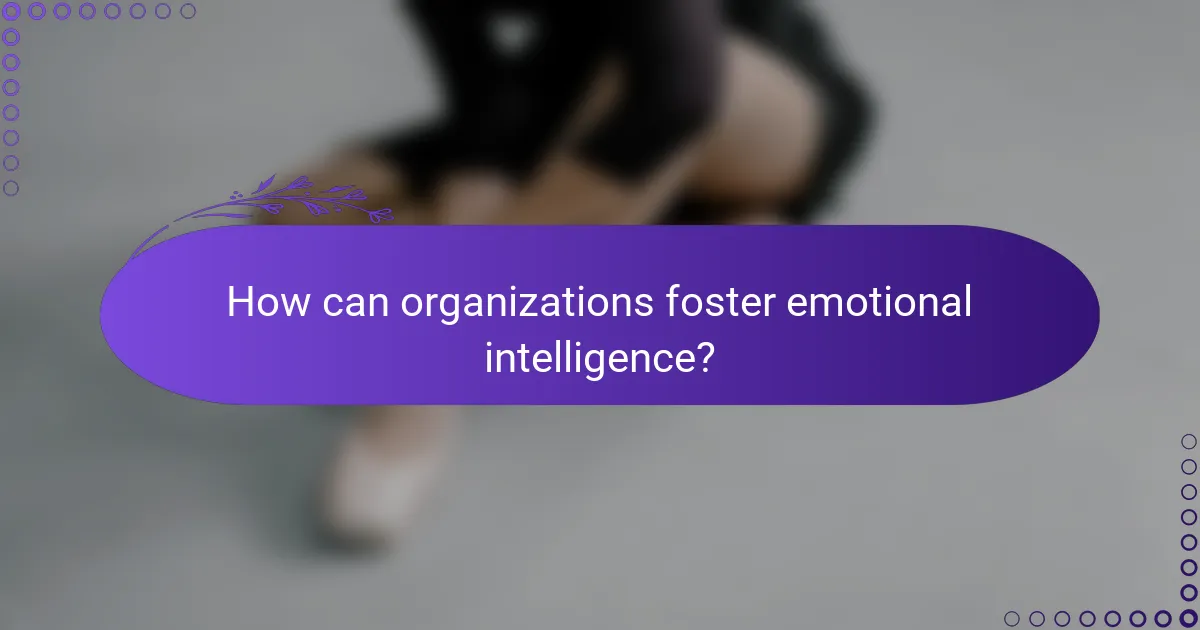
How can organizations foster emotional intelligence?
Organizations can foster emotional intelligence by creating a culture that values self-awareness, empathy, and interpersonal skills. This involves training programs, supportive leadership, and opportunities for employees to practice these skills in real-world situations.
Training programs
Implementing training programs focused on emotional intelligence can significantly enhance employees’ skills. These programs should cover topics like self-regulation, empathy, and effective communication. Workshops and seminars can be tailored to specific teams or departments to address their unique challenges.
Consider using role-playing exercises and real-life scenarios to help employees practice their emotional intelligence in a safe environment. Regular feedback and coaching can further reinforce these skills.
Supportive leadership
Leaders play a crucial role in fostering emotional intelligence within their organizations. By modeling emotionally intelligent behavior, leaders can set a standard for their teams. This includes demonstrating empathy, active listening, and conflict resolution skills.
Encouraging open communication and providing a safe space for employees to express their feelings can strengthen trust and collaboration. Leaders should also recognize and reward emotionally intelligent behaviors to reinforce their importance.
Opportunities for practice
Providing opportunities for employees to practice emotional intelligence is essential for development. This can include team-building activities, mentorship programs, and cross-departmental projects that require collaboration and understanding of diverse perspectives.
Encourage employees to reflect on their interactions and seek feedback from peers. Regularly scheduled check-ins can help individuals assess their progress and identify areas for improvement.
